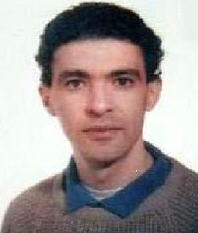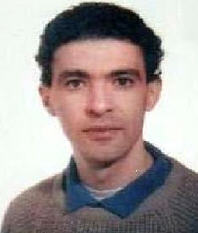

Djamel's story, by Frida Berrigan, appeared in her column Trapped by Guantanamo in Foreign Policy in Focus, November 19, 2010.
Djamel Ameziane was born April 14, 1967. A member of the Berber ethnic group, he fled his native Algeria in his early twenties to seek a better life. He found that better life as a chef at Al Caminetto Trattoria, one of the best Italian restaurants in Vienna. Forced to leave when his visa was not renewed, Ameziane went to Canada. Living and working in Montreal, Ameziane sought political asylum there as well. When that claim was denied in 2000, he was out of options. He decided to go to Afghanistan because as J. Wells Dixon, a member of his legal team and a senior staff attorney at the Center for Constitutional Rights, explained: “he believed it was only there that he could live in peace, anonymously and permanently.”
But Djamel Ameziane was in the wrong place at the wrong time. Soon after he settled, the U.S. launched the October 2001 war against Afghanistan. He tried to flee the fighting, but was captured by local police while trying to cross the border into Pakistan. Like so many others who were captured along the border, he was turned over to U.S. forces for a bounty of $2,000 or $5,000. Next he was held at Kandahar Airbase in Afghanistan. Later, Ameziane was transported to Guantanamo in February 2002, making him one of the earliest prisoners held at the notorious facility.
Ameziane has never been charged with a crime. There is no credible evidence that he took up arms against the United States or posed a threat to this country. He remains at Guantanamo because the United States cannot send him back to Algeria and has not found a third country to host him.
Algeria has also not been Ameziane’s home for nearly two decades and he should not be forced to return there. Returning to Algeria would expose Djamel Ameziane to even more suffering. He grew up in Kabylie, an unstable region in the north known for frequent, violent clashes between the Algerian army and Islamic resistance groups. In April, the State Department issued a travel warning for Kabylie, citing “terrorist attacks, including bombings, false roadblocks, kidnappings, ambushes, and assassinations.” Practicing Muslims, like Ameziane, are automatically suspected of supporting the resistance and are frequently harassed, targeted for arrests by the government because of their religious practices.
The stain of having spent time in Guantánamo would alone be enough to put him at risk of being imprisoned if he is returned. The first two Algerians transferred out of Guantánamo in July 2008 were disappeared for two weeks and likely subjected to interrogation by Algeria’s “military security” police. Other Algerian nationals at Guantanamo have said, through their lawyers, that they would rather stay in the prison than return to their country of origin.
Until a third country comes forward to offer him resettlement protection, Ameziane remains at Guantanamo. Djamel is a college graduate who speaks French, Arabic and English fluently and can communicate in German, making him an attractive candidate for any number of countries.
In 2008, his lawyers submitted an application for resettlement in Canada, where he lived in for five years before being denied asylum. The Anglican Church in Canada is prepared to sponsor Djamel Ameziane’s settlement, where one of his brothers also lives. Barry Clarke, Anglican bishop of Montreal, said: "Having read what Djamel has suffered and the risk he would face if returned to Algeria, I am convinced that sponsoring him is the right thing to do.” Canada is not the only option. If the Austrian government agreed to resettle Ameziane, his old boss at the Al Caminetto Trattoria is eager to rehire him as a chef.
Despite his long separation from family and his painful ordeal, Djamel continues to pursue his interests-- he enjoys drawing and water coloring, he reads French mystery novels and plays soccer. Djamel says: “I have only ever wanted to live quietly and peacefully in a country where I would not suffer persecution. That is still my goal.”
Frida Berrigan is a columnist for Foreign Policy in Focus and an organizer with Witness Against Torture which will hold an action on January 11, 2011 and then fast and vigil for the next twelve days in Washington, DC. For more information visit, www.witnesstorture.org
More information:
Center for Constitutional Rights' website includes background information, a letter written by Mr. Ameziane, and a synopsis of Mr. Ameziane's habeas corpus petition.